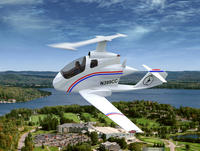-
Study finds nearly 90 percent of businesses victim of cyber attacks
A recent survey of information technology (IT) security professionals reveals that cyberattacks are on the rise and businesses have had difficulty defending their networks; 84 percent admitted to having been the victim of a cyber attack; these attacks have been costly causing a majority of companies an estimated $500,000 or more in lost revenues, cash outlays, business disruptions, and other expenses
-
-
High tech more effective than tax climate in driving states' economic growth
Race-to-the-top policies are generally defined as those involving investments in education, entrepreneurship, and infrastructure; race-to-the-bottom policies involve competition among the states for jobs by using lower taxes and industrial recruitment incentives; researchers find that states with more technology classes in school, higher domain name registrations, and more people online tended to economically outperform states with a lower emphasis on technology
-
-
CACI International to acquire Pangia Technologies
Last Monday CACI said that they had reached a definitive agreement with Pangia, a software engineering firm that develops solutions for computer network operations, information assurance, mission systems, and IT infrastructure support; the move will expand CACI’s cybersecurity capabilities and bolster its presence among the U.S. intelligence community
-
-
Homeland security market in India projected to double

India’s homeland security market is projected to double by 2018, growing to $16 billion; the total market value is comprised of government spending as well as private sector expenditures and some export demand; the homeland security market is expected to expand to $13 billion by 2014 creating significant opportunities for the private sector to provide government needs
-
-
Weather variations cost U.S. $485 billion a year

New research finds that routine weather events such as rain and cooler-than-average days can add up to an annual economic impact of as much as $485 billion in the United States; the study found that finance, manufacturing, agriculture, and every other sector of the economy is sensitive to changes in the weather, and that the impact of routine weather variations on the economy is as much as 3.4 percent of U.S. gross domestic product
-
-
New commuting method: Personal Aerial Vehicles

Researchers in Germany have an idea for solving the growing congestions in urban centers: a Personal Aerial Vehicles (PAVs) for traveling between homes and working places; the PAVs will fly at low altitude in urban environments, thus making it unnecessary to change current air-traffic control regulations
-
-
Digital Barriers acquires Zimiti, expands homeland security capabilities
Digital Barriers, an international homeland security and defense firm based in the United Kingdom, recently acquired Zimiti Ltd for £1.5 million, or roughly $2.5 million; the acquisition gives Digital Barriers access to Zimit’s Unattended Ground Sensor (UGS) technology which is aimed at expanding Digital Barriers’ reach in the including border control, critical infrastructure protection, and defense markets
-
-
Ceramic armor receives development prize
New ceramic armor has many advantages: currently the ceramic composite offers a 30 percent weight saving compared with an armor plate of the same size made of alumina ceramics and is 15 percent lighter than another widely used ceramic armor, silicon carbide; it also requires a much lower furnace temperature meaning less energy is used and less CO2 is produced in manufacture, making it an environmentally-friendly product
-
-
Brazilian bank explores online biometric ID
Bradesco, one of Brazil’s largest banking and insurance companies, is studying if it can identify account holders online using biometrics to ensure the safest transactions possible; the bank is currently working with Fujitsu to develop a device that is capable of identifying customers at home; the bank currently uses Fujitsu’s PalmSecure biometric palm reader in its ATMs
-
-
Strong 1Q growth for U.S. solar power, more expected
The United States showed strong first quarter growth in solar panel capacity, increasing installations by 66 percent; the increase in solar capacity is due largely to falling panel prices and developers taking advantage of government incentives that were set to expire in 2010; analysts expect solar panel growth to increase throughout the year
-
-
Railroad protests $400 million in fines for smuggling drugs
Railroad companies are protesting nearly $400 million in fines for illegal drugs smuggled aboard its trains; under U.S. law, all shipping companies are subject to fines of $500 per ounce of marijuana and $1,000 per ounce of heroin or cocaine if U.S. Customs and Border Protection agents find drugs hidden in their cargo; Union Pacific argues that they are being punished for the actions of drug smugglers which they cannot control
-
-
Xceedium wins award for securing DHS networks
On Tuesday, Xceedium Inc. won Infosecurity Products Guide magazine’s 2011 Best Customer Deployment Award; the award comes for Xceedium’s work in providing DHS with privileged access management solutions; to help DHS ensure that its networks are accessed by only approved users, Xceedium, a manufacturer of access control systems, has provided the agency with its GateKeeper system
-
-
Mississippi River floods to cause large Gulf of Mexico dead zone
Hypoxia, which creates oceanic dead zones, is caused by excessive nutrient pollution, often from human activities such as agriculture, which results in too little oxygen to support most marine life in bottom and near-bottom water; scientists are predicting the dead zone area in the Gulf could measure between 8,500 and 9,421 square miles, or an area roughly the size of New Hampshire; the largest hypoxic zone measured to date occurred in 2002 and encompassed more than 8,400 square miles
-
-
Technology helps law enforcement predict threats -- and prepare for them
3i-MIND is the LEIM 2011 event to show its technology — a family of configurable solutions which help law enforcement agencies gather and analyze open-source and other intelligence in order to predict and prepare for threats; the technology uses deep-Web tools to access leads found only in social networks, chat rooms, and online forums
-
-
New powertrain improves fuel economy, adds hp Chevrolet Impala Police
GM says that a new 3.6L V-6 engine and a 6-speed automatic transmission achieves 302 hp and an estimated fuel economy of 17 mpg city and 27 mpg highway — a 3 mpg advantage over previous Impala models and 28 percent better than the Ford Crown Victoria; the 2012 Impala can accelerate from 0-60 mph in 6.6 seconds, based on GM engineering tests
-
More headlines
The long view
Factories First: Winning the Drone War Before It Starts
Wars are won by factories before they are won on the battlefield,Martin C. Feldmann writes, noting that the United States lacks the manufacturing depth for the coming drone age. Rectifying this situation “will take far more than procurement tweaks,” Feldmann writes. “It demands a national-level, wartime-scale industrial mobilization.”
Trump Is Fast-Tracking New Coal Mines — Even When They Don’t Make Economic Sense
In Appalachian Tennessee, mines shut down and couldn’t pay their debts. Now a new one is opening under the guise of an “energy emergency.”
Smaller Nuclear Reactors Spark Renewed Interest in a Once-Shunned Energy Source
In the past two years, half the states have taken action to promote nuclear power, from creating nuclear task forces to integrating nuclear into long-term energy plans.
